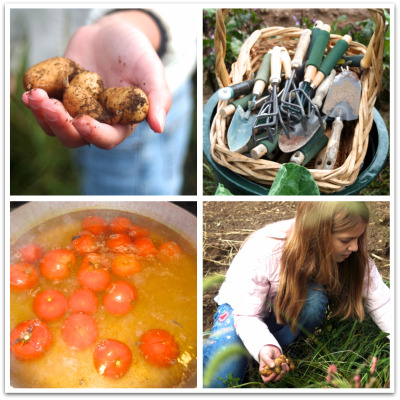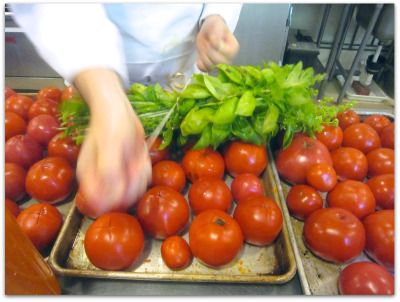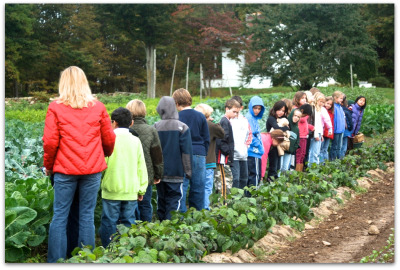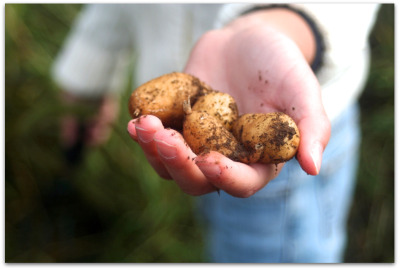School Lunch Makeover: From Farm To Fork
 I walked into the Unquowa School kitchen this morning to talk to Chef Peter Gorman and Chef-in-Residence Lauren Issaeff, as they were busily making 80 gallons of heirloom tomato sauce to be served to the children, faculty and staff over the course of the school year. Peter and Lauren had their hands full with the seeds, pulp and juices from the various colored heirloom tomatoes that had been freshly picked from Sport Hill Farm, up the road in Easton. On top of the stove, garlic, (also from Sport Hill Farm), simmered in olive oil, and a large bundle of basil, from Gilbertie’s Farm, sat patiently waiting to be tossed in. I was overcome by the wonderful aromas swirling around the kitchen. It was just 9:00 a.m., but how I wished it was lunchtime! This is not an atypical scene in this private school’s kitchen.
I walked into the Unquowa School kitchen this morning to talk to Chef Peter Gorman and Chef-in-Residence Lauren Issaeff, as they were busily making 80 gallons of heirloom tomato sauce to be served to the children, faculty and staff over the course of the school year. Peter and Lauren had their hands full with the seeds, pulp and juices from the various colored heirloom tomatoes that had been freshly picked from Sport Hill Farm, up the road in Easton. On top of the stove, garlic, (also from Sport Hill Farm), simmered in olive oil, and a large bundle of basil, from Gilbertie’s Farm, sat patiently waiting to be tossed in. I was overcome by the wonderful aromas swirling around the kitchen. It was just 9:00 a.m., but how I wished it was lunchtime! This is not an atypical scene in this private school’s kitchen.
At The Unquowa School, in Fairfield CT, it is not unusual for the children to walk in to the dining room as they wait for the first bell of the day to ring, to wish the chefs a good morning and find out what the day’s menu. Parents will wander in too, with hopes there may be something delicious needing to be sampled. Here, education extends way beyond the four walls of the classroom. How the students fuel their bodies is equally important as how they fuel their minds.
 Seven years ago Unquowa welcomed a new Head of School. After taking a year to closely observe the inner workings, Sharon Lauer decided that one of the first projects she would oversee was a complete re-haul of the dining program. While the school was already serving family-style meals with a full and varied salad bar, many pre-packaged, processed and frozen foods were also used. The kids, for the most part, were happy with their meals, which were not necessarily well balanced. Sure, there were apples available to students on a daily basis, but they hailed from Washington State. Ms. Lauer believed that much could be done to improve the quality of food as well as
Seven years ago Unquowa welcomed a new Head of School. After taking a year to closely observe the inner workings, Sharon Lauer decided that one of the first projects she would oversee was a complete re-haul of the dining program. While the school was already serving family-style meals with a full and varied salad bar, many pre-packaged, processed and frozen foods were also used. The kids, for the most part, were happy with their meals, which were not necessarily well balanced. Sure, there were apples available to students on a daily basis, but they hailed from Washington State. Ms. Lauer believed that much could be done to improve the quality of food as well as  reduce waste by serving the children healthy food that was both regional and seasonal. They would start with baby steps. Eggs would be cage-free and the milk would be organic.
reduce waste by serving the children healthy food that was both regional and seasonal. They would start with baby steps. Eggs would be cage-free and the milk would be organic.
Ms. Lauer knew she would need a little assistance with this task, so she sought the help of John Turenne. John Turenne’s company – Sustainable Food Systems was recruited last school year by Jamie Oliver for his Emmy Award winning television show, The Food Revolution. SFS’s role was to educate Jamie on the idiosyncrasies of the US School Food business; develop recipes; and then train the kitchen staffs in 28 schools in Cabell County WV. John say’s his team’s role was the “Reality behind the Reality Show.”
With John’s help, the school was able to  rid itself of all the pre-packaged goods and replace them with fresh fruit and snacks that were purchased locally and in bulk. The small, single-serve cartons of milk were removed and replaced with organic milk. Eggs fresh from Sherwood Farm, just up the hill in Easton, Connecticut, were served daily. This all had to be done within the school’s very modest budget. The school began to recycle. The immediate result was astounding. The 50 gallons of trash produced in one lunch period had been reduced to just one!
rid itself of all the pre-packaged goods and replace them with fresh fruit and snacks that were purchased locally and in bulk. The small, single-serve cartons of milk were removed and replaced with organic milk. Eggs fresh from Sherwood Farm, just up the hill in Easton, Connecticut, were served daily. This all had to be done within the school’s very modest budget. The school began to recycle. The immediate result was astounding. The 50 gallons of trash produced in one lunch period had been reduced to just one!
Ms. Lauer also realized that it was crucial to include her students in this process. They needed to be able to “understand the importance of these decisions and their implications,” which would be possible by allowing them to take part. Organic kitchen gardens were built on campus, and a composting program was established and run by the students. By the year’s end the school established a connection with local farmer, Patti Popp of Sport Hill Farm in Easton, who was willing to allow the students “to spend time at her farm planting and harvesting so that they could experience the cycle of food production and the simple magic of growing things.”
 The Unquowa School has now seen 5 very successful years in their Farm to Fork program. With the continued support of Sustainable Foods, LLC, they have been able to add grass-fed beef and free-range chicken to their menu. The school orders its milk from The Farmer’s Cow, a cooperative of Connecticut dairy farmers managed by Robin Chesmer of Greywall Farms in Lebanon, Connecticut. The school has continued to grow their relationship with Patti Popp, manning a farm camp in the summer and putting spring and fall working visits into the curriculum for all students.
The Unquowa School has now seen 5 very successful years in their Farm to Fork program. With the continued support of Sustainable Foods, LLC, they have been able to add grass-fed beef and free-range chicken to their menu. The school orders its milk from The Farmer’s Cow, a cooperative of Connecticut dairy farmers managed by Robin Chesmer of Greywall Farms in Lebanon, Connecticut. The school has continued to grow their relationship with Patti Popp, manning a farm camp in the summer and putting spring and fall working visits into the curriculum for all students.
Ms. Lauer states that the students learn that eating whole, seasonal and organic foods not only benefits their health, but their environment as well. Furthermore, they now have an “understanding of the importance of these implications and how they affect not just them personally, but the world around them.”
The school currently strives to serve food that is only whole, fresh and seasonal. The following is a list of minimum specifications that guide the chefs in their menu creations:
• Keep food affordable without compromising quality
• Serve organic food to the maximum extent possible and manage costs to achieve this
• No food shall be manufactured on a facility that uses nuts or nut products
• Cook food from scratch and serve it fresh
• Satisfy health and diet needs of clientele – vegan, vegetarian requests and attention to specific allergy/dietary needs
• Serve only fresh, whole eggs from chickens raised in a cage-free environment
• Use only milk, grass-fed beef and natural poultry from animals raised without the use of growth hormones
• Use only natural oils – No hydrogenated oils or fats
• No ingredient shall contain high fructose corn syrup
• No food will be deep fried
• Salad dressings will be homemade and low-fat or organic
• Tuna must be dolphin safe
• Deli meats will all be nitrate and nitrite free
• Pastas will be whole wheat
• Flour will be unbleached
• Rice will be organic
• All breads will be baked in house
Additional Notes:

In 2005, when the school first embarked on its sustainable food initiative, John Turenne suggested that the school create its own granola to serve to students. Because the school is nut-free, it was determined that the recipe should focus on using organic oats and sweetened with local honey and maple syrup. The school’s chef, Peter Gorman, invited students to help make and test the recipes. The resulting batches were so popular that parents inquired about purchasing some for home. The students also were instrumental not only in helping to develop the granola but in getting involved with the development of a brand image, logo and business plan for public distribution. The granola is currently available for sale at Sport Hill Farm under the name Founder’s Hall.
Several years ago, in an effort to keep as many products as local as possible, the school began to purchase its honey from The Red Bee Apiary in Weston, Connecticut.
The school is also launching a Chef-in-Residence program. This year this new program was created in recognition of the need for specific culinary training in sustainable school dining. Each resident will spend a year or two in the Unquowa kitchen to learn the various aspects of Farm to Fork dining in schools.
Unquawa School Heirloom Tomato Sauce
Serves 6 – 10
Ingredients:
5 pounds fresh (heirloom not necessary) tomatoes
4 whole cloves of garlic
“Generous” amount of olive oil, used to cover garlic and bottom of the pan
A large bunch of basil, leaves still attached to the stem
Kosher salt, to taste
Directions:
Bring a large pot of water to a boil
Score the bottom of each tomato (mark an X shape with a sharp knife)
Place in boiling water for no more than a minute or two
Remove from water as soon as the skin starts to peel away
Let cool, peel skin from tomatoes
Cut tomatoes in half, remove seeds
Using your hands, squeeze tomatoes to drain any excess liquid
Place in strainer or colander to further remove excess liquid
In a large pot bring olive oil to a boil
Add the garlic and allow the garlic to turn a nice, golden brown
When garlic is lightly browned add your tomatoes
Cook for about 20 minutes
With an immersion blender, puree the tomatoes and garlic until well blended. (This can be done in a blender if necessary.)
Cook an additional 30 minutes
Remove from pot, can if desired, or serve for dinner!Sidebar…
























